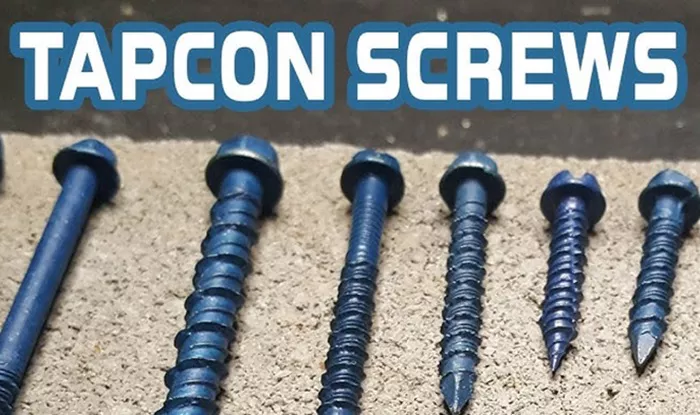When it comes to fastening materials to concrete, masonry, or other hard surfaces, choosing the right type of fastener is crucial. Two common options are Tapcon screws and traditional fasteners. Each has its own set of advantages and applications. This article will explore the differences between Tapcon screws and traditional fasteners to help you determine which is best for your project.
Understanding Tapcon Screws
What Are Tapcon Screws
Tapcon screws, also known as concrete screws, are specially designed fasteners that are used to anchor materials directly into concrete, brick, or masonry. They feature a unique thread design that allows them to cut into hard surfaces, creating a secure hold without the need for anchors.
Features and Benefits
Thread Design: Tapcon screws have hardened, sharp threads that cut into concrete or masonry, providing a strong grip.
Installation: They are installed using a standard drill with a masonry bit, making them relatively easy to use.
Holding Power: Tapcon screws offer high tensile strength and can handle heavy loads when properly installed.
Corrosion Resistance: Many Tapcon screws are coated to resist corrosion, making them suitable for both indoor and outdoor applications.
Applications
Concrete: Securing brackets, fixtures, or panels to concrete surfaces.
Masonry: Attaching items to brick or block walls.
Brick: Mounting shelves or other fixtures in brick walls.
See also: How To Use A Screw Extractor?
Traditional Fasteners
What Are Traditional Fasteners
Traditional fasteners include a variety of types, such as nails, screws, bolts, and anchors, designed for general use in wood, metal, or other standard materials. When it comes to concrete or masonry, traditional fasteners often require additional components like anchors or plugs to create a secure connection.
Features and Benefits
Variety: Traditional fasteners come in numerous shapes and sizes, providing a wide range of options for different materials and applications.
Ease of Use: Many traditional fasteners are straightforward to install in wood or metal and do not require special tools beyond a standard screwdriver or drill.
Cost: Often less expensive than specialty fasteners like Tapcon screws, especially for materials other than concrete or masonry.
Applications
Wood: Securing boards, panels, or other components in woodworking projects.
Metal: Fastening metal parts together in construction or manufacturing.
Concrete/Masonry: Typically used with anchors or plugs to secure items to hard surfaces.
Comparing Tapcon Screws and Traditional Fasteners
1. Installation Process
Tapcon Screws: Installation is relatively simple. Drill a pilot hole using a masonry bit, then drive the Tapcon screw into the hole. No anchors are needed.
Traditional Fasteners: For concrete or masonry, traditional fasteners often require anchors or plugs to create a secure connection, which can add complexity to the installation process.
2. Strength and Durability
Tapcon Screws: Known for their high holding power and durability in concrete and masonry applications. They provide a strong, secure hold without the need for additional anchors.
Traditional Fasteners: Strength varies depending on the type and material. When used with anchors, they can be effective but may not match the holding power of Tapcon screws in hard surfaces.
3. Versatility
Tapcon Screws: Specifically designed for use in concrete, masonry, and brick. They are not suitable for wood or metal without additional components.
Traditional Fasteners: Highly versatile and can be used in a variety of materials, including wood, metal, and with appropriate anchors, in concrete and masonry.
4. Cost
Tapcon Screws: Generally more expensive than standard fasteners but can save time and effort by eliminating the need for anchors.
Traditional Fasteners: Often less expensive, especially for non-concrete applications, but may require additional components for use in masonry or concrete.
5. Corrosion Resistance
Tapcon Screws: Many models are coated for corrosion resistance, making them suitable for outdoor use.
Traditional Fasteners: Corrosion resistance depends on the material and coating. Stainless steel or coated fasteners are necessary for outdoor or high-moisture environments.
See also: How To Find A Stud Without A Stud Finder?
Choosing the Right Fastener for Your Project
Considerations for Tapcon Screws
Surface Type: Ideal for concrete, masonry, or brick.
Project Requirements: Best for applications where a strong, direct hold is needed without additional anchors.
Environmental Factors: Choose Tapcon screws with corrosion-resistant coatings for outdoor or wet environments.
Considerations for Traditional Fasteners
Material: Suitable for wood, metal, and with appropriate anchors, concrete or masonry.
Cost: May be more cost-effective for projects involving materials other than concrete.
Flexibility: Provides a wide range of options for various materials and applications.
Conclusion
Both Tapcon screws and traditional fasteners have their place in construction and DIY projects. Tapcon screws offer a specialized solution for anchoring directly into concrete, masonry, and brick with minimal installation complexity. Traditional fasteners, on the other hand, provide versatility and can be used in a broader range of materials, often requiring additional components like anchors for hard surfaces. Ultimately, the choice between Tapcon screws and traditional fasteners will depend on the specific requirements of your project, including the material you are working with, the strength needed, and your budget. By understanding the advantages and limitations of each option, you can make an informed decision and ensure the success of your fastening tasks.
Related Topics:
-
Evaluating Chainsaw Sharpeners: Which Model Offers The Best Performance?
-
Milwaukee Tool Set Innovations: What’s New And Exciting In 2024
-
DeWalt Vacuum Maintenance Tips: How To Keep Your Tool In Top Condition
-
How Effective Is The Google Bubble Level For Home Improvement Projects?

